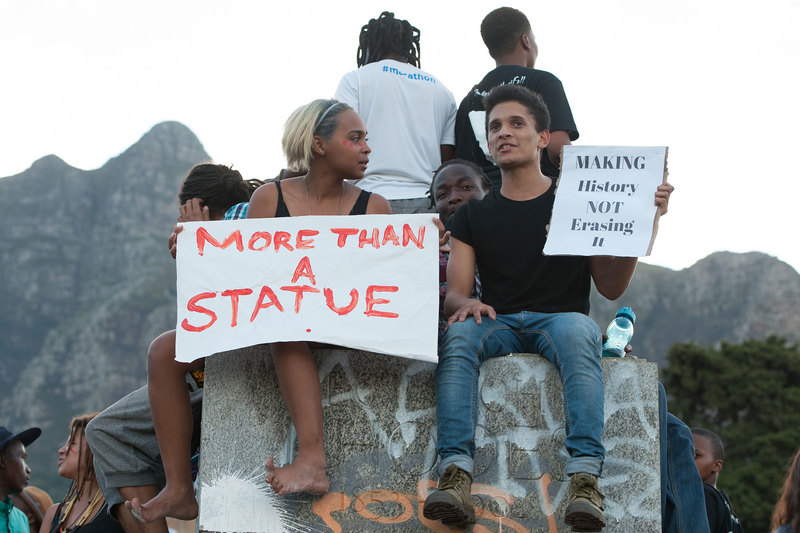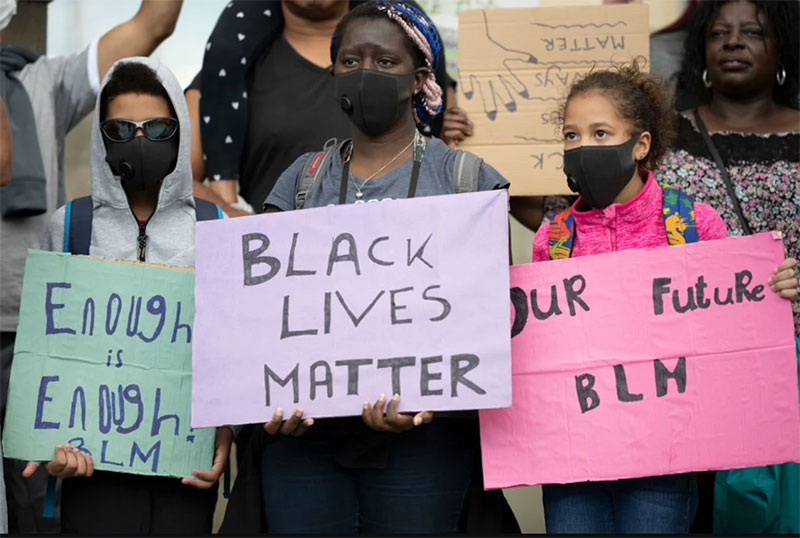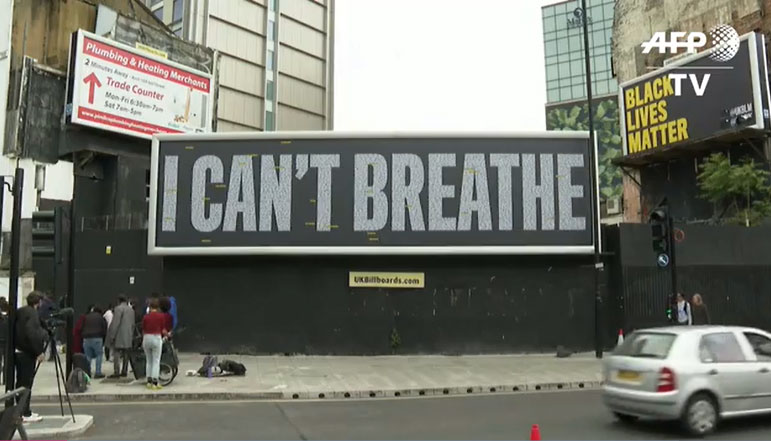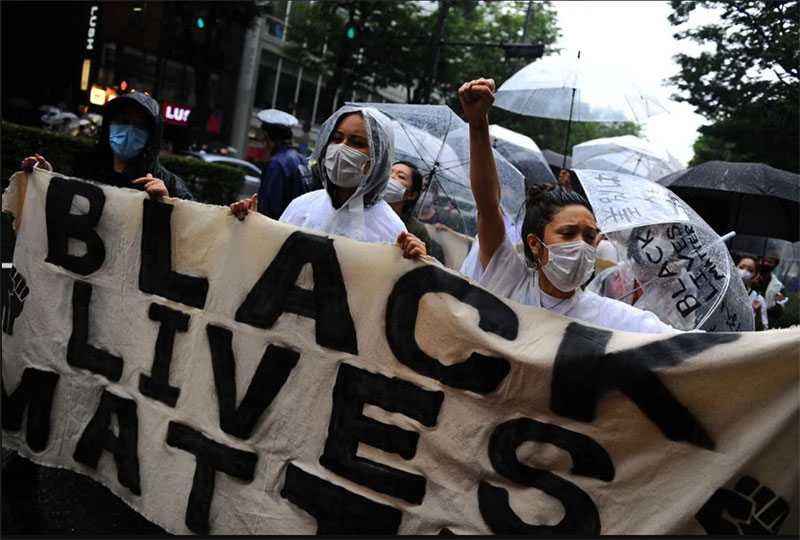A world in turmoil
17 June 2020 | Story Alphose Zingoni. Read time >10 min.
Alphose Zingoni, Professor of Structural Engineering and Mechanics at the University of Cape Town (UCT) and director of the Klaus-Jürgen Bathe Leadership Programme at UCT, writes about lessons for South Africa, particularly our youth, following recent events in the United States (US) precipitated by George Floyd’s killing.
The responsibility of changing the world rests on the shoulders of all of us, but more so on the shoulders of young people, who are the future of the world.
As if the Covid-19 pandemic was not enough, the world recently witnessed the killing of George Floyd, a 46-year-old unarmed black man, at the hands of white police officers in the city of Minneapolis in the USA. The event, which happened on 25 May, 2020, precipitated widespread protests across major cities in the US and across the world, as people from all walks of life united and marched in condemnation of this act of racism and outright violation of human rights.
Here, at home, there have been incidences of heavy-handedness by the police and the army in enforcing the regulations of the Covid-19 lockdown. In this contribution, we will only focus on the issues relating to racism.
There are lessons that we, as a country, can learn from the events in the USA, especially our younger generation, whose responsibility it is to ensure a better future for all citizens - a future that fulfills the dream of the American Civil Rights leader Dr Martin Luther King Jr - namely a world in which our children "will not be judged by the colour of their skin, but by the content of their character".
In dark moments such as these, we can draw hope from the words of former SA President Nelson Mandela: "No one is born hating another person because of the colour of his skin, or his background, or his religion."
The first statement acknowledges that something is very wrong in society (and hence needs to be fixed), while the other implies that human prejudice is not irreversible and can be cured through preaching the message of love of fellow human beings.

Both men fought tirelessly against racism and inequality in their countries.
Of course, racism and inequality are not synonymous, and inequality can still exist in those societies that are racially homogeneous, referring to societies in which racism cannot be present. However, it has to be acknowledged that in racially heterogeneous societies, racism can be an underlying cause of inequality, in terms of access to opportunities and basic human needs (housing, clean water, sanitation, health facilities, education, transport, energy, and information technology).
One consequence of inequality is that certain sections of society become more vulnerable to the effects of natural disasters and disease, as has been observed in the Covid-19 pandemic, where black communities in the USA, United Kingdom, France and other countries have suffered disproportionately high numbers of infections and deaths compared with other racial groups. Some have argued that these groups of people have underlying conditions, but such conditions could be a result of the poverty and inequality that these communities have had to endure.
What was particularly disturbing about the Floyd case, apart from the heartlessness of Derek Chauvin in keeping his knee on the neck of Floyd for eight minutes 46 seconds until he choked to death, was the passive complicity of the other three police officers. They just stood by and watched as Floyd uttered those haunting words "I can’t breathe", until he lost consciousness and eventually died.
This went against the natural instinct of most human beings to help another human being, who is fighting for his or her life. Within two days, murder charges were brought against Chauvin, and, several days later, as pressure mounted from relentless protest action and public outrage, charges were also brought against the other three officers. The arrest of the four officers went some way in pacifying the anger of the protesters, but clearly this was not enough; there was something fundamentally wrong in the system itself, and this has to be fixed.
“Troubling as this event was, it has brought together, from across the world, people of different colour, creed and religion, in condemnation of racism and abuse of human rights.”
Such universal solidarity gives us good reason to be hopeful about the future. We are of the belief that, within society, there is intrinsically more good than evil (otherwise humanity would not have survived this long), and when the good part comes together in the way that we have recently seen, evil will ultimately be defeated.
The protests that began in the USA have assumed an international dimension, and spread all over the world. Thousands of people have marched to denounce racism in cities like Ottawa, Montreal, Reykjavik, Rio de Janeiro, Mexico City, London, Birmingham, Manchester, Paris, Berlin, Vienna, Amsterdam, Sydney, Tokyo, Lagos, Nairobi, Cape Town, Pretoria, Johannesburg and many others.
Despite the risk of exposure to the coronavirus, which continues to cause so much pain and suffering in many countries around the world, humanity has united in its condemnation of racism and police brutality. The international human rights movement, Black Lives Matter, has been at the forefront of the campaign against violence and systemic racism towards black people since its founding in 2013, and they are leading the ongoing campaign of protests.

The killing of Floyd by law enforcement agents has once again brought to the fore the systemic racism that exists in American institutions and the wider society. Only three months earlier, on 23 February, 2020, Ahmaud Arbery, a black young man of 25, was jogging in a neighbourhood in the state of Georgia, when he was shot dead by a white father and his son. As in the case of Floyd, video evidence led to the two being eventually charged with murder.
A search of the internet shows that many such incidents have occurred in the United States in the last few years alone, and if we go back 60 years to the time of King, there are countless. Before the advent of video-recording smartphones, many escaped public attention.
Of course, racism is a global phenomenon, and is not confined to the USA alone. Why there has been so much international solidarity over the recent outrage in the USA is the fact that many people of colour around the world identify with the same deprivation of equal treatment as that experienced by black people in the United States - from the indigenous minorities of Australia, New Zealand and North America, to the millions of black people that inhabit the cities of Europe, and the majority of the populations in the former European colonies of Africa, Asia and South America.
The people in these different parts of the world see something of themselves, or of their loved ones, in Floyd, and his pain became their pain. What happened in Minneapolis is symptomatic of the racism that pervades the world, where people are treated differently, depending on the colour of their skin. This is the inequality that both King and Mandela, and many other civil rights activists around the world, fought against.
Racism takes many forms, and has numerous manifestations. These range from subtle acts of discrimination on innocent young children (such as when a white teacher separates a minority of black children from a majority of white children in the course of classroom activities, and then allocates more attention to the white group of children), to unequal access to education, health and employment opportunities, resulting in more poverty, disease and crime in the black communities compared with white communities.
“It manifests itself as unequal privileges in the workplace, as when black people are paid less than white people for the same amount and same type of work, or are made to work under more hazardous conditions or with less protective equipment than their white counterparts.”
It also takes the form of social hostility (when black people are made to feel unwelcome, or are actually not welcome, in social gatherings or certain public environments, or when they are taunted in the football stadiums of Europe); unequal treatment by immigration authorities or law-enforcement agents (racial profiling; unreasonable denial of entry into a country; unnecessary deportations; unfair arrests; unlawful detentions; police brutalities); unequal treatment by the justice system (black people denied access to a fair trial, or given heavier sentences than white people); and violent acts of hatred against black people (beating or killing of innocent black people).
Many countries have made significant progress in addressing various forms of racism, particularly the more explicit type of racism, but a lot more still needs to be done.
What is in common with all these manifestations of racism is the unequal treatment of different groups of people on the basis of the colour of their skin, the assumption that one race of people is more superior than another, a notion that both King and Mandela vigorously fought against, and which all these different protesters around the world today are standing up against.
The scale of the protests, both in the US and internationally, has signalled that change is long overdue. As former US President Barack Obama has said: "We both have to highlight a problem and make people in power uncomfortable."
These protests have achieved that, but more importantly, it is hoped that they will act as the catalyst for meaningful and far-reaching changes towards the eradication of racism. As many have observed, there is something different about these protests; there is a feeling that we are now finally at the turning point.

However, sustained effort, energy and momentum will be required to propel the world towards the final goal of true equality. It is an effort that requires the contribution of all peoples, regardless of their colour. What is most encouraging are the age and composition of the people that have been in the midst of all these international protests: young energetic people of all races, all fighting for the cause of equality of human beings.
"When sometimes I feel despair, I just see what's happening with young people all across the country, and the talent and the voice and the sophistication that they're displaying," Obama recently said.
The movement, Black Lives Matter, was founded by young people, and is mostly made up of young people.
In South Africa, the Soweto uprising of 1976, brutally suppressed by the government authorities of the time, was led by young black students, so was the Rhodes Must Fall movement 40 years later, which began at the University of Cape Town with the removal of the statue of Cecil John Rhodes (a symbol of British Imperialism and the colonisation of Africa), and subsequently became a protest against perceived institutional racism at the university.
What is clear from all this is that the youth are the drivers of change, and we have to invest in young people, so that they can create a better future for all - a future in which all people have equal access to opportunity, and are judged by their ability, not the colour of their skin.
Important lessons can be learnt from what has happened in America. The immediate one is that when good men stand by and do nothing, evil will prevail. The three police officers who stood by while Floyd choked under Chauvin's knee were not necessarily good men in the sense of being innocent of the crime, but the fact of the matter is that they did not intervene to stop their colleague from killing Floyd.
This is not a new lesson; history abounds with many such examples. For instance, dictators have risen to absolute power, and subsequently committed gross violations of human rights, because society looked away, or did not exercise its collective power to prevent the rise of such individuals. Young people must be prepared to stand up and speak against the ills in society, otherwise nothing will change and evil will prevail.
Secondly, we must recognise that racism is a worldwide scourge; it has dangerous consequences and must be confronted by good citizens in every country with the urgency it deserves.
Thirdly, protests are a powerful instrument of conveying a grievance against those in power - but, for maximum effect, they must be conducted in a peaceful manner. The responsibility of changing the world rests on the shoulders of all of us, but more so on the shoulders of young people, who are the future of the world.
Finally, we need good moral leadership; if leaders in the government, in the public sector and in the private sector are all people of high moral standard, their goodness will spread down to all levels of society and squeeze out evil, resulting in a society where peace and equality prevail.
Alphose Zingoni is Professor of Structural Engineering and Mechanics in the Department of Civil of Engineering, and the Director of the Klaus-Jürgen Bathe Leadership Programme at the University of Cape Town.










